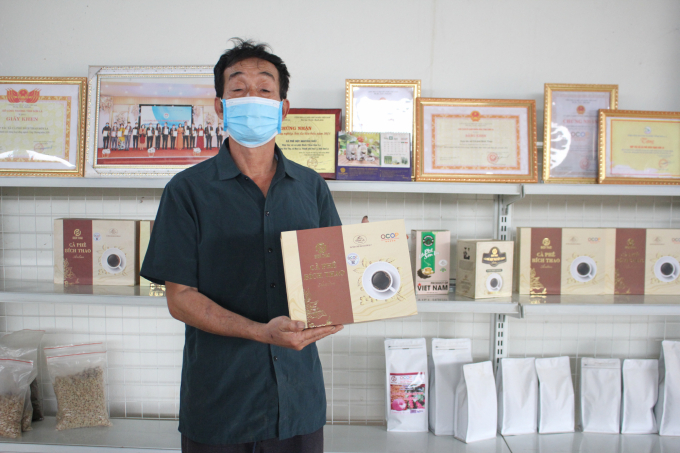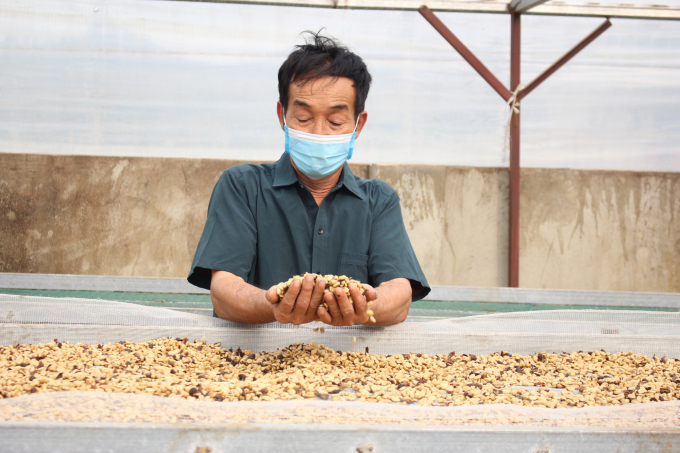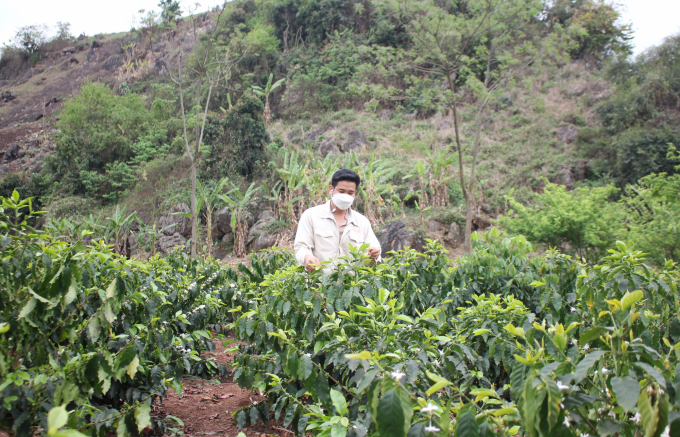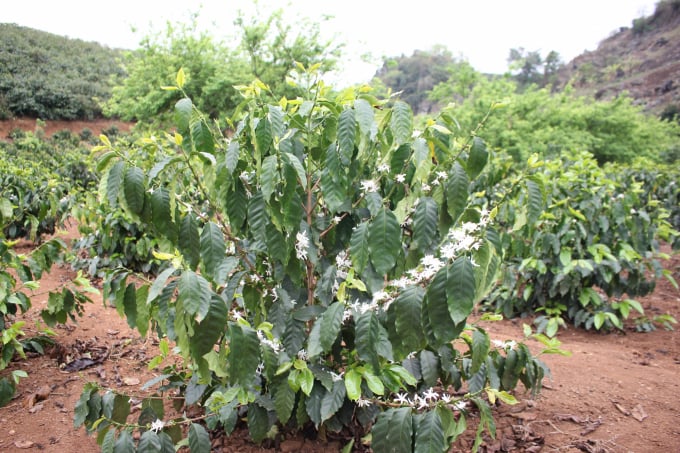May 30, 2025 | 01:23 GMT +7
May 30, 2025 | 01:23 GMT +7
Hotline: 0913.378.918
May 30, 2025 | 01:23 GMT +7
Hotline: 0913.378.918
Son La is currently one of the localities with the largest area for Arabica coffee production in the country. This province is also considered a new land in helping to reposition the image and brand of Vietnamese coffee on the world map. Son La coffee has had a strong transformation with a new look in 2017 when the National Office of Intellectual Property (Ministry of Science and Technology) granted the geographical indication certificate of "Son La coffee” for different types of products: green coffee, roasted coffee beans and powdered coffee.

Bich Thao pure powdered coffee product has been evaluated and recognized as a 5-star OCOP product by the National OCOP Product Classification Evaluation Council in 2020. Photo: Trung Quan.
Significant effort by businesses and cooperatives in Son La in promoting the construction of raw material areas, applying scientific and technical advances in farming, forming chain links in production, processing, consumption, etc. has contributed to creating a unique brand and value for Son La coffee. One of such supporters is Bich Thao Coffee Cooperative, Hoang Van Thu village, Hua La commune (Son La city, Son La province) directed by Mr. Nguyen Xuan Thao.
Mr. Thao revealed: Local people's life in the past was extremely difficult, impoverished in all means, their lives only revolved around corn, cassava roots but there was a constant state of food shortage. Ever since coffee trees are introduced to this land, they brought higher economic value compared to previous inefficient crops, and local people have also begun to dream of leading a more fulfilling life.
However, before people could enjoy such lives, many difficult problems have posed for coffee growers including: Increasingly strict requirements for the quality of the market's products; no stable consumption channel available, farmers were often pressured on prices because they are completely dependent on traders, etc.
In face of such problems, Mr. Thao as well as many coffee growing households realized that: Transforming production towards productivity, quality and safety is a prerequisite for maintaining the brand, creating a foothold and raising income. With that in mind, he began to embark on a journey to find ways to increase the value of Son La coffee, alleviating the problem of "good season, bad harvest" that had tormented the farmers for a long time.
He established Bich Thao Coffee Cooperative with 11 members in 2017. Although the cooperative is still relatively young, Mr. Thao and his members are all farmers who have been attached to coffee trees since their childhood, understanding coffee trees as well as they do themselves. As a result, the cooperative quickly became one of the six units granted the right to use the geographical indication of Son La coffee by the Department of Science and Technology.
Mr. Thao shared: The cooperative was oriented to not focus on quantity but instead it was steered towards promotion of science and technology application in improving the quality of coffee ever since its inception. With this goal in mind, the cooperative has mobilized its members and associated households to apply the coffee production process following VietGAP and UTZ standards, build high-quality specialized material areas, cultivate entirely using organic methods, each field is numbered for easy traceability, etc.

Bich Thao Cooperative has succeeded with the honey coffee processing method, which helped to improve value and overcome environmental pollution. Photo: Trung Quan.
Additionally, with the support of technical transfer by experts from Germany and the US, the cooperative has succeeded with honey coffee processing method, helping to improve the coffee value as well as overcome environmental pollution.
According to Mr. Thao, the advantage of honey coffee processing method is that it does not require high mechanization, so it has low investment costs and consumes less water compared to traditional wet processing, which helps reduce pressure in water treatment for coffee-growing areas, suitable for areas lacking water in mountainous areas.
However, in order to produce quality coffee products with unique flavors, farmers must strictly comply with technical requirements in the processes of seeding, care, collection, and processing. The harvest is carried out by selective picking method, ensuring 100% red ripe coffee. The drying process for coffee beans must be closely monitored, continuously raking is required to prevent the growth of mold causing damage due to high humidity, etc.
With this new direction, the cooperative has grown steadily after 5 years of establishment. On average, the cooperative processes and sells 4,000-5,000 tons of green coffee/year, 10-12 tons of pure ground coffee. 80% of the products are exported to Korea, Germany, the US, etc. The revenue reaches 20-40 billion VND (depending on export conditions each year, the harvesting capacity each season, etc.), regular jobs are created for 10 local workers with an income of 5-6 million VND/person/month.
The cooperative currently has two main products: pure powdered coffee and syrup made from coffee pods (coffee berry tea). These are products that have been successfully researched, processed and produced by the cooperative in service of the export market.

To ensure the quality of processed coffee products, the cooperative regularly invites technical staff to the plantations to supervise and guide farmers on the correct standard process. Photo: Trung Quan.
Bich Thao pure powdered coffee product in particular has been evaluated and recognized as a 5-star OCOP product by the National OCOP Product Classification Evaluation Council in 2020. This can be considered as a stepping stone for coffee products in Son La province to take off, build domestic brand value and connect with export countries around the world.
According to Mr. Thao, in order to get a 5-star product, along with the attention and help from the Ministry of Agriculture and Rural Development, the People's Committees of provinces and districts, the cooperative members must strictly comply with the production process, mindset adjustments for outdated farming habits, application of modern processing technologies, create specialty coffee products meeting the tastes of domestic and foreign markets.
The cooperative participated in the experimental model of organically growing THA1 new coffee variety in 2018, with a scale of 15 hectares in Tat village, Muong Do commune (Phu Yen) and 5 hectares in Hoang Van Thu village, Hua La commune (Son La city). The model is part of the National Coffee Development Program implemented by the Eakmat Coffee Research and Technology Transfer Center (Institute of Agro-Forestry Science and Technology in the Central Highlands) in collaboration with the Ministry of Agriculture and Rural Development.
The cooperative expanded the area of THA1, TN6, TN7 and TN9 coffee varieties by 40 hectares in Hua La and Chieng Ban communes (Mai Son), bringing the total area of new coffee varieties to 60 hectares.
“Thai varieties THA and TN have the ability to adapt to harsh weather conditions. Coffee can be harvested after 3 years of growing with an average yield of 25-30 tons of fresh fruit/hectare, at a selling price of 20,000-25,000 VND/kg of fresh fruit, with 80% of the beans reaching grade 18 (type 1), shared Mr. Thao.
According to Mr. Thao, the cooperative has expanded production links with 800 coffee growing households in the province to expand the production scale and ensure a stable supply of raw materials for processing. Additionally, the cooperative also invests in building material foundations for the production and processing of high-quality products.

The cooperative has pioneered in planting new coffee varieties such as THA1, TN6, TN7, etc. organically to improve productivity and commercial value. Photo: Trung Quan.
The cooperative started construction of a coffee processing factory with a scale of over 1,100 m² in 2021. The factory has a capacity of 20 tons of green coffee/day, with a total investment of 16 billion VND (the City People's Committee supported 2.1 billion VND, the remaining capital was mobilized by the cooperative). The processing line is designed following a closed process design, including a screening machine, a size sieve, a weight sieve, a color shot machine of German and American design, a roasting machine, a coffee grinder, a storage warehouse, a display area for product introduction. The cooperative also invested in building 3 greenhouses with a total area of over 2,200m² for preliminary processing and coffee processing.
Regarding future directions, Mr. Thao said: According to the commercial production plan for the 2021-2022 crop year, Bich Thao Coffee Cooperative is planning to purchase and process 3,000-3,500 tons of green coffee. In addition to supplying traditional customers, the cooperate will also boost exports to new markets such as the UK, Japan, etc.
In addition, the cooperative aims to replant 30-50% of the old expired coffee area with new coffee varieties from 2022 to 2025, giving higher quality yields, ensuring export standards.
Translated by Nguyen Hai Long
/2025/05/25/4127-3-073637_820.jpg)
(VAN) Thanks to the promotion from an FAO-implemented project, vegetable production in greenhouses in Moc Chau has seen strong development, from 1.5 hectares in 2021 to nearly 50 hectares in 2024.

(VAN) FAO has recently supported USD 140,000 to implement the project 'Risk mitigation human-animal interface risks through disease control initiatives in pig farming.'

(VAN) The People's Committee of Tra Vinh province has approved an adjustment to the investment policy for the Green Hydrogen Plant project, increasing its area to approximately 52.76 hectares.
![Reducing emissions from rice fields: [2] Farmers’ commitment to the soil](https://t.ex-cdn.com/nongnghiepmoitruong.vn/608w/files/news/2025/05/05/dsc08881jpg-nongnghiep-140632.jpg)
(VAN) Clean rice cultivation model in Thuong Tan commune, Bac Tan Uyen district, is assisting local residents in achieving sustainable agriculture by substantially reducing costs, increasing productivity, and protecting the environment.

(VAN) At the conference to disseminate Resolution No. 68, AgriS introduced its digital agricultural ecosystem and reaffirmed its commitment to accompanying the Government in promoting private sector development and sustainable agriculture.

(VAN) 'Blue Ocean - Blue Foods' initiative is designed to restore marine ecosystems and establish sustainable livelihoods for local communities by cultivating a minimum of 1,000 hectares of cottonii seaweed in the first three years.
/2025/05/21/4642-3-112707_603.jpg)
(VAN) The V-SCOPE project has made direct contributions to three out of six pillars of the Comprehensive Strategic Partnership between Vietnam and Australia.